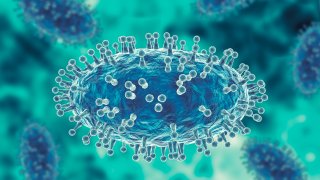
The World Health Organization is planning to rename monkeypox to minimize discrimination and stigmatization as the virus continues to spread globally.
Dr. Tedros Adhanom Ghebreyesus, the WHO’s director-general, said the organization was “working with partners and experts from around the world on changing the name of the monkeypox virus, its clades and the disease it causes."
This comes after more than 30 international scientists in an online report called for an "urgent" change to the name, which they say "references to the 2022 outbreak as belonging to the 'West African' or 'Western African' clade, strain, or genotype."
The recent global outbreak of the virus has infected over 1,900 people in over 30 countries. The virus was first reported in the 1970s with repeated outbreaks around Western and Central Africa since. However, the scientists' group says the decades-old report is inaccurate as not enough evidence confirms the origin.
"The most obvious manifestation of this is the use of photos of African patients to depict the pox lesions in mainstream media in the global north," scientists stated. "Recently, Foreign Press Association, Africa issued a statement urging the global media to stop using images of African people to highlight the outbreak in Europe."
Get Tri-state area news delivered to your inbox. Sign up for NBC New York's News Headlines newsletter.
The scientists also argued that the name counters the practice to refrain from "geographic locations in the nomenclature of diseases and disease groups." Throughout the proposal, the scientists refer to the strain as “hMPXV,” rather than monkeypox, as a placeholder.
The Foreign Press Association of Africa put out a statement on May 21 expressing their "displeasure" with perpetuating negative stereotypes.
"We condemn the perpetuation of this negative stereotype that assigns calamity to the African race and privilege or immunity to other races," the statement said.
The concern around the names of virus strains and their ties to geographical origins that can eventually stimulate discrimination against certain groups is, however, nothing new.
The WHO previously moved quickly to rename SARS-COV-2 after critiques surfaced around former President Donald Trump's and others' frequent use of the phrase "Chinese virus" in reference to COVID-19. At the time Trump also cited previous illnesses, such as the "West Nile Virus," as justification.
U.S. & World
Other viruses that have been referred to as "Spanish Flu," "Zika," and "Ebola" have all referenced geographical areas and impacted communities from such places.
Experts have argued that despite the fact that the names and practice had been the case for decades, it is no longer appropriate.
The scientists concluded their report by encouraging others to learn from this experience as an opportunity to advance both funding and understanding for future outbreaks.
"We hope that the world uses the current outbreak to advance our understanding, and provides the funding and focus for effective regional and global public health surveillance for emerging and re-emerging threats," the scientists said. "Failure to support and adopt the proposed nomenclature and classification may result in loss of interest in sustaining active surveillance and rapid reporting of pathogens with epidemic and pandemic potentials, by scientists and national public health institutions in Africa and other LMICs."



